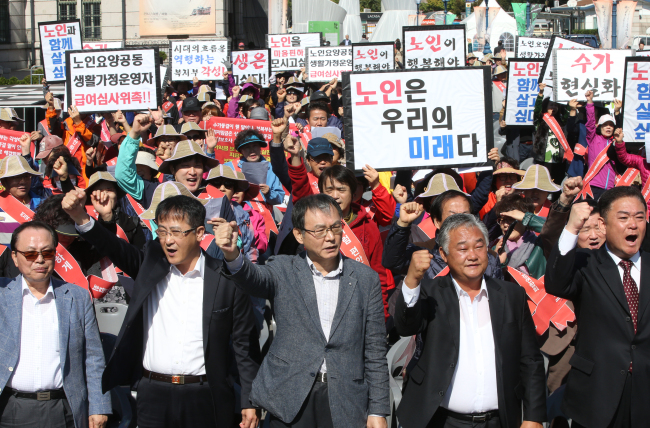The Korean government’s proposal to raise the state pension age from 65 to 70 in its attempt to save on the cost of welfare programs is facing fierce opposition from the elderly population as well as local experts and critics.
Once the proposal is implemented, those aged 65-69 will become ineligible to receive all state welfare benefits for the elderly, including state pension payments and free public transportation.
The proposal was recently released after the Korea Senior Citizens’ Association, one of the largest representative bodies of Korean senior citizens, publicly showed its support to the government’s plan to raise the retirement age back in May.
Once the proposal is implemented, those aged 65-69 will become ineligible to receive all state welfare benefits for the elderly, including state pension payments and free public transportation.
The proposal was recently released after the Korea Senior Citizens’ Association, one of the largest representative bodies of Korean senior citizens, publicly showed its support to the government’s plan to raise the retirement age back in May.

“We have decided that this is the right way to coexist with the younger generation, who are struggling with unemployment,” said Kang Se-hoom from the KSCA, which has some 3 million members. “We hope that the change of the retirement age can help the government create more (welfare) programs and jobs for young Koreans.”
However, a man who has connection to the organization, who did not wish to be named, said the number of KSCA members in their 60s is very small compared to those currently aged 70 or older, and therefore the vast majority of the members won’t be affected even if the retirement age changes. The KSCA refused to give the exact numbers of members in the 60s and those aged 70 or older.
According to the man, the KSCA has been receiving aggressive requests to support the government proposal from the public transit companies, who claimed that the exemption of public transportation fares among the elderly has been one of their major cases of deficits. The fares have been free for all citizens aged 65 or older since 1984.
Last year, Seoul Metro, a public corporation that runs Seoul Subway Lines 1, 2, 3, 4 and 9, reported net losses of 158.7 billion won ($139.9 million), mostly caused by fare exemption for the elderly.
The Health Ministry predicts that some 2.3 trillion won in welfare programs will be saved once the retirement age is raised to 70 from the current 65.
However, Nonyeon Union, a group of elderly unionized workers, warned that raising the retirement age would result in more suicides among the elderly. Korea’s elderly suicide rate has more than tripled since 2000, almost four times higher than the Organization for Economic Cooperation and Development average as of 2010. Almost 50 percent of the entire elderly population are living below the poverty line as of last year, partly because of inadequate public welfare programs.
“One of the government’s reasons for proceeding with this proposal is that, more than 80 percent of the elderly population in Korea does not define those in their 60s as ‘senior citizens,’ according to their recent survey,” said Koh Hyun-jong from the union. “I’m sure one would feel flattered if she or he is told that they look younger than they actually are. But feeling flattered cannot compensate for what we need in order to survive during our postretirement age.”
Professor Lee Geum-yong from Samgmyung University said changing the retirement age can have a critical impact on the lives of those aged 65-69, especially those who don’t have a postretirement plan.
“(In Korea), the quality of one’s life can worsen significantly after he or she retires,” he said. “Getting a job that pays enough after retirement is not easy. The current welfare programs are not enough for one to have an income that he or she used to have before retiring from their job.”
A recent report showed that transfer payments, such as social retirement benefits and public pension payments, only make up about 28.8 percent of the average income of the Korean elderly, while they account for almost 70 percent of the average income of senior citizens in many European countries, such as Denmark and the U.K.
The high elderly poverty rate and inadequate public transfer payments mean that most of the Korean elderly must stay employed, even if they don’t want to, or financially depend on their family members or children in order to live above the poverty line, the report claimed.
By Claire Lee (dyc@heraldcorp.com)












![[Today’s K-pop] BTS pop-up event to come to Seoul](http://res.heraldm.com/phpwas/restmb_idxmake.php?idx=644&simg=/content/image/2024/04/17/20240417050734_0.jpg&u=)




![[KH Explains] Hyundai's full hybrid edge to pay off amid slow transition to pure EVs](http://res.heraldm.com/phpwas/restmb_idxmake.php?idx=652&simg=/content/image/2024/04/18/20240418050645_0.jpg&u=20240419100350)

![[Today’s K-pop] Zico drops snippet of collaboration with Jennie](http://res.heraldm.com/phpwas/restmb_idxmake.php?idx=642&simg=/content/image/2024/04/18/20240418050702_0.jpg&u=)